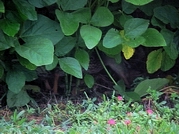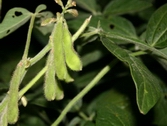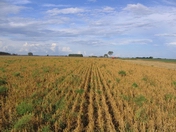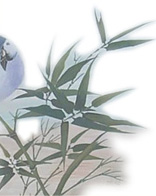|
 LISTEN-TEXT LISTEN-TEXT LISTEN To SHIRLEY SINGS THE POEM LISTEN To SHIRLEY SINGS THE POEM
 Hi, friends, today's Chinese classical poem names Qi Bu Shi, in English means a poem was written within walking seven steps. In Chinese literature history, there is a very famous poem group of a father and two sons. They are just Cao2 Cao1, Cao2 Pi1 and Cao2 Zhi1. Hi, friends, today's Chinese classical poem names Qi Bu Shi, in English means a poem was written within walking seven steps. In Chinese literature history, there is a very famous poem group of a father and two sons. They are just Cao2 Cao1, Cao2 Pi1 and Cao2 Zhi1.
Cao2 Cao1(A.D.155 - A.D.220) was a very famous politician, militarist and poet in "the Three Kingdoms (Wei, Shu Han and Wu)"times (A.D. 222вҖ•A.D.280)and the emperor of the North of China. After he was dead, his older son Cao1 Pi1(A.D.187- A.d.226) became the new emperor. He was a great poet and he created the first Qi Yan Poem (there are 7 words in every line) in Chinese poetry history. :-) Cao2 Zhi is the youngest son of Cao2 Cao1 and he made the highest literature achievement in this group of family poets, therefore, he was also the favorite son of Cao1 Cao's , and almost to be the crown prince.
After Cao2 Pi became the emperor, he scared his brother to take his position away, so, he often wanted to find a reason to kill his little brother. One day, he asked Cao Zhi to make a poem within walking 7 steps. Otherwise, he would be killed. However, as soon as he finished his order, Cao Zhi completed his poem. This is just the famous poem we will learn.
Now, there are about 90 poems by Cao Zhi in the world, and most of them are Wu Yan poem (There are 5 words in every line), he really did a great work to push the Wu Yan Poem to be developed in the Chinese literature history.
For helping you remember the poem easily, I wrote a music to match the peom and hope you enjoy it. :-)
MAIN MEANING OF THE POEM :
Burning beanstalks to cook beans,
The beans are crying in the kettle:
"Both of us were born from the same parents,
why you want to fry me so urgently?"
 CHINESE PRONUNCIATION CHINESE PRONUNCIATION
 LISTEN To SHIRLEY SINGS THE POEM : LISTEN To SHIRLEY SINGS THE POEM :
Qi1 Bu4 Shi1
zhu3 dou4 ran2 dou4,
dou4 cai4 fu3 zhong1 qi4.
ben3 shi4 tong2 gen1 sheng1,
ziang1 jian2 he2 tai4 ji2?
NEW WORDS:
дёғ: qi1 -- seven
жӯҘ: bu4 -- step
иҜ—: shi1 -- poem, poetry
з…®иұҶзҮғиұҶиҗҒ:to burn beanstalks to cook beans ( here means fratricidal strife, the fight among brothers is like to boiling beans with beanstalks).
з…®пјҡzhu3 -- cook, boil
иұҶпјҡdou4 -- bean, soybean
зҮғпјҡran2 -- burn
иұҶиҗҒпјҡdou4 qi2 -- bean stalk
иҗҒпјҡqi2 -- stalk
иұҶеңЁйҮңдёӯжіЈ: Beans are weeping and crying in the kettle
еңЁпјҡzai4 -- in, at
йҮңпјҡfu3 -- kettle, boiler
дёӯпјҡzhong1 -- in, inside
жіЈпјҡqi4 -- tear, cry, weep
жң¬жҳҜеҗҢж №з”ҹ: (we are) born of the same root (parents)
жң¬пјҡben3 -- original
жҳҜпјҡshi4 -- be , is , are
еҗҢж №з”ҹ:tong2 gen1 shang1 -- born of the same root/parents
еҗҢпјҡtong2 --same
ж №пјҡgen1 -- root, parent
з”ҹ: bear, give birth to
 зӣёз…ҺдҪ•еӨӘжҖҘ:Why you want to fry me so urgently? зӣёз…ҺдҪ•еӨӘжҖҘ:Why you want to fry me so urgently?
зӣёз…Һпјҡto fry each other( here means to fight between brothers, fratricidal).
зӣё:xiang1 -- each other
з…Һ:jian1 -- fry, decoct
дҪ•пјҡhe2 -- why
еӨӘпјҡtai4 -- too
жҖҘпјҡji2 -- in a hurry, quick, urgent
CHINESE CHRACTERISTICS LISTEN To SHIRLEY SINGS THE POEM : LISTEN To SHIRLEY SINGS THE POEM :
дёғжӯҘиҜ—
з…®иұҶзҮғиұҶиҗҒпјҢ
иұҶеңЁйҮңдёӯжіЈгҖӮ
жң¬жҳҜеҗҢж №з”ҹпјҢ
зӣёз…ҺдҪ•еӨӘжҖҘгҖӮ
Note: About this poem there are two versions. One of them includes 6 lines and this one includes 4 lines, but the basic meaning is same. Now I am introducing the 4 lines' one.
This is a very famous Chinese classical poem, the last two sentences often being the titles of the articles to express the meaning that the same industry, same country, same areas, people should not fry each other. So, after you know the two sentences, when you read this kind of titles, you can guess out the meaning of the articles before reading it.
 Ok, that's all for this poem and hope you enjoy it. If you have any questions, comments and suggestion, please write to shirley@ebridge.cn , you are welcomed. Ok, that's all for this poem and hope you enjoy it. If you have any questions, comments and suggestion, please write to shirley@ebridge.cn , you are welcomed.
-- Shirley
Written on Fri., Sep 24, 2005
Edited and Recorded on Sat., Sep 25, 2005
|

